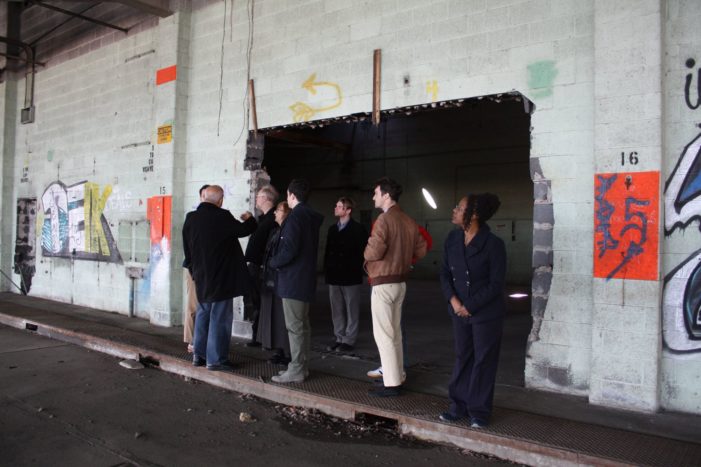My community development path started, unbeknownst to me, at age 8 or 9. I spent a lot of time with my grandma who led a block club and sat on many organizational boards throughout Brooklyn. Because of all the time I spent with her, I also spent a significant amount of time in government officials’ offices as she fought to get them to repave streets or install a speed bump on her block, all of which were done.

I distinctly remember watching her go to each of her neighbors’ homes to get them to sign petitions. At the time, I didn’t know the terms “community organizing” or “community development.” I saw what she was doing simply as, “There’s something wrong with our block and it needs to be fixed.”
I enjoyed the process of organizing for change and repeated the process in my personal life as a middle-schooler by getting my classmates to sign a petition called “MS After School SUX!!” because the teachers who ran it wouldn’t allow us to go to the vending machines by ourselves. I had a meeting with the teachers who asked me why I had started the petition. They listened to me and changed the rule – another injustice corrected.
Between the end of middle school and college, I forgot all of this and became a pretty rebellious, hedonistic kid. I majored in religious studies in college, and during my sophomore year I ended up in rehab. I came out re-focusing my attention from doing drugs to educating youth about drugs.
I graduated in 2013 with a new focus and I decided I needed more education and training, so I applied to graduate school, ending up at the University of Michigan’s School of Public Health. While there I focused on drug education and youth development in Ann Arbor, Ypsilanti and Detroit. I even started a nonprofit called The Calmplex, devoted to holistic youth development.
I learned a lot about how to work with youth, but I also learned a lot about the youth themselves and the environments in which they lived. I was especially touched by the young people I met in Detroit who were Osborn residents and had extreme pride in and commitment to their neighborhood. My involvement with these young people reminded me how much I had enjoyed organizing for change.
I decided to move to Detroit and expand from working specifically to support youth to working to support communities. So I applied for a position with Building the Engine.
Since 2016 Building the Engine of Community Development in Detroit has been operating as a citywide process that will strengthen all of Detroit’s neighborhoods by creating a coordinated, effective and equitable framework for community development work in our city. By 2020, through a rigorously disciplined and collaborative process, we aim to build a career and academic leadership pipeline for anyone to become a professional community developer.
Are you a resident leader who has been volunteering in the neighborhood and wants to convert that experience to a meaningful job? Are you a mid-career professional who wants to switch careers? Are you a college student trying to figure out how to turn your passion for Detroit into a paid position? Are you a retiree looking to keep making contributions through your work?
The “Academic Tracks Planning Team” of Building the Engine is now working with the Corporation for a Skilled Workforce and the Southeastern Michigan Community Learning Partnership to make it possible for anyone to reach for a career in community development.
Guiding the effort is a stalwart group of academic leaders and community development practitioners, who are using wisdom gained from real people who are now working in the field. The academic institutions involved include University of Detroit Mercy, University of Michigan Dearborn, Marygrove College, Wayne State University, Henry Ford Community College, and Lawrence Technological University.
Now, here I am again, back in politicians’ offices and engaging with stakeholders as we attempt to fix what’s wrong, but this time with a term for it – community development.
If you work in community development in Detroit, we want to hear your story, too. Please contact us on our Facebook page.
Editor’s Note: Lauren Boone is project manager for Building the Engine of Community Development in Detroit. For more information, please visit www.buildingtheengine.squarespace.com.
 REAL CHANGE, REAL TALK
REAL CHANGE, REAL TALK
Building the Engine has launched the “Real Change, Real Talk” series is in partnership with Community Development Advocates of Detroit (CDAD), the Michigan Nonprofit Association (MNA), Lawrence Technological University and TheHUBDetroit.
The program’s goal is twofold. First, it will create space throughout all the neighborhoods for authentic discussions on Detroit neighborhoods. Second, it will bring stakeholders from every corner of the city and many different organizations together to listen and learn from each other.
The next “Real Change, Real Talk” is Thursday, July 27, 4:30-7:30 at Bakers Keyboard Lounge in District 2. The topic is “How Can Neighborhoods Benefit from the New Developments in Midtown and Downtown?
This meeting will feature a small panel, which includes Donna Givens of Eastside Community Network, Chris Uhl of Rock Ventures and District 3 City Councilmember Scott Benson. They will propose several specific ideas and discuss some existing models from other cities, then open the discussion to those attending.
Every Detroit City Council District, beginning with District One, will host a gathering. Some of the venues include Bakers Keyboard Lounge, The Dakota Inn, Northern Lights, the Cadieux Café and many more.


